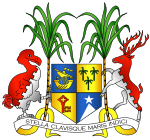This article has multiple issues. Please help improve it or discuss these issues on the talk page. (Learn how and when to remove these messages)
|
 |
|---|
| Constitution |
Since 1967, Mauritius has experienced 13 free and fair democratic general elections to choose a government.
The National Assembly has 70 members elected for a five-year term, 62 by plurality in 21 multi-member constituencies (plurinominal first-past-the-post with panachage) and, a maximum of, 8 additional members nominated by the Best Loser System.
The government is formed by the party or group which controls a majority on the unicameral legislature. The president and vice-president are then elected by the National Assembly for a five-year term by the parliament.
On a regional level, the country has village and district councils, and municipal elections every 6 years.
Mauritius has a multi-party system which is mainly dominated by three parties namely Militant Socialist Movement (MSM), the Labour Party and Mauritian Militant Movement (MMM).
Out of the 13 national elections, the MSM has won six (1983, 1987, 1991, 2000, 2014 and 2019), the Labour Party won five (1967, 1995, 2005, 2010 and 2024) and the MMM won two (1976 and 1982). The premiership of the country has alternated between two dynasties, namely Ramgoolam and Jugnauth, except for a short period of 2003-2005 where Paul Berenger was prime minister under an alliance with the Jugnauths.